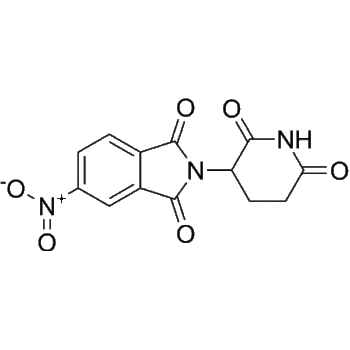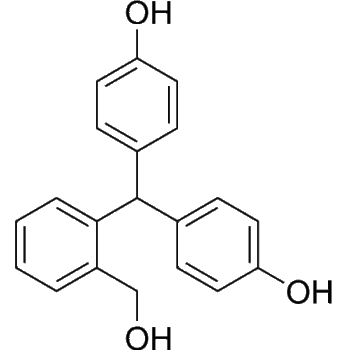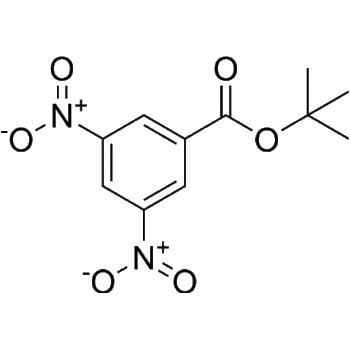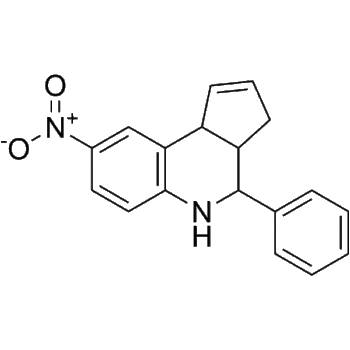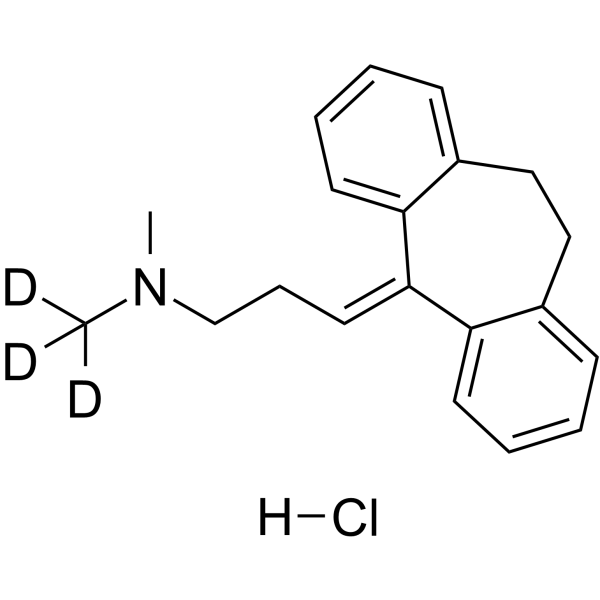
Download Files:
Amitriptyline-d3 (hydrochloride)
SKU
HY-135096-1 mg
Category Reference compound
Tags 5-HT Receptor;Adrenergic Receptor;Histamine Receptor;mAChR;Serotonin Transporter;Sodium Channel;Trk Receptor, GPCR/G Protein;Immunology/Inflammation;Membrane Transporter/Ion Channel;Neuronal Signaling;Protein Tyrosine Kinase/RTK, Neurological Disease
$160 – $510
Products Details
Product Description
– Amitriptyline-d3 hydrochloride is the deuterium labeled Amitriptyline (hydrochloride). Amitriptyline hydrochloride is an inhibitor of serotonin reuptake transporter (SERT) and noradrenaline reuptake transporter (NET), with Kis of 3.45 nM and 13.3 nM for human SERT and NET, respectively. Amitriptyline hydrochloride also weakly binds to dopamine reuptake transporter (DAT) with a Ki of 2.58 μM. Amitriptyline hydrochloride also inhibits adrenergic, muscarinic, histamine and 5-HT receptors. Amitriptyline hydrochloride is a TrkA and TrkB receptors agonist with potent neurotrophic activity. Amitriptyline hydrochloride has antidepressant activity[1][2][3].
Web ID
– HY-135096
Storage Temperature
– 4°C (Powder, sealed storage, away from moisture and light)
Shipping
– Room Temperature
Molecular Formula
– C20H21D3ClN
References
– [1]Jang, S.W., et al., Amitriptyline is a TrkA and TrkB receptor agonist that promotes TrkA/TrkB heterodimerization and has potent neurotrophic activity. Chem Biol, 2009. 16(6): p. 644-56.;Kim Lawson. A Brief Review of the Pharmacology of Amitriptyline and Clinical Outcomes in Treating Fibromyalgia. Biomedicines. 2017 Jun; 5(2): 24.;S Neil Vaishnavi , et al. Milnacipran: a comparative analysis of human monoamine uptake and transporter binding affinity. Biol Psychiatry. 2004 Feb 1;55(3):320-2.|[2]Russak EM, et al. Impact of Deuterium Substitution on the Pharmacokinetics of Pharmaceuticals. Ann Pharmacother. 2019;53(2):211-216.
CAS Number
– 342611-00-1
Molecular Weight
– 316.88
Compound Purity
– 99.46
SMILES
– [2H]C(N(C)CC/C=C1C2=CC=CC=C2CCC3=CC=CC=C13)([2H])[2H].[H]Cl
Clinical Information
– No Development Reported
Research Area
– Neurological Disease
Solubility
– 10 mM in DMSO
Target
– 5-HT Receptor;Adrenergic Receptor;Histamine Receptor;mAChR;Serotonin Transporter;Sodium Channel;Trk Receptor
Pathway
– GPCR/G Protein;Immunology/Inflammation;Membrane Transporter/Ion Channel;Neuronal Signaling;Protein Tyrosine Kinase/RTK
Product type
– Reference compound
Disclaimer: All products are for Research use only unless clearly stated otherwise on the product datasheet. Datasheets provided on the website are drafts for reference purpose only and you are requested to always refer to the hard copy included in the kit for your experimentation. Agdia Products are available for delivery only in Canada.
